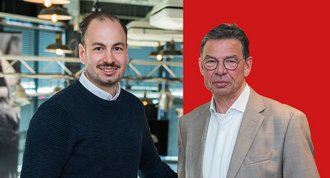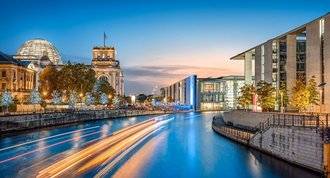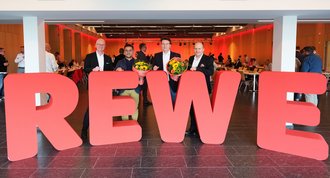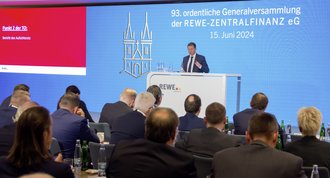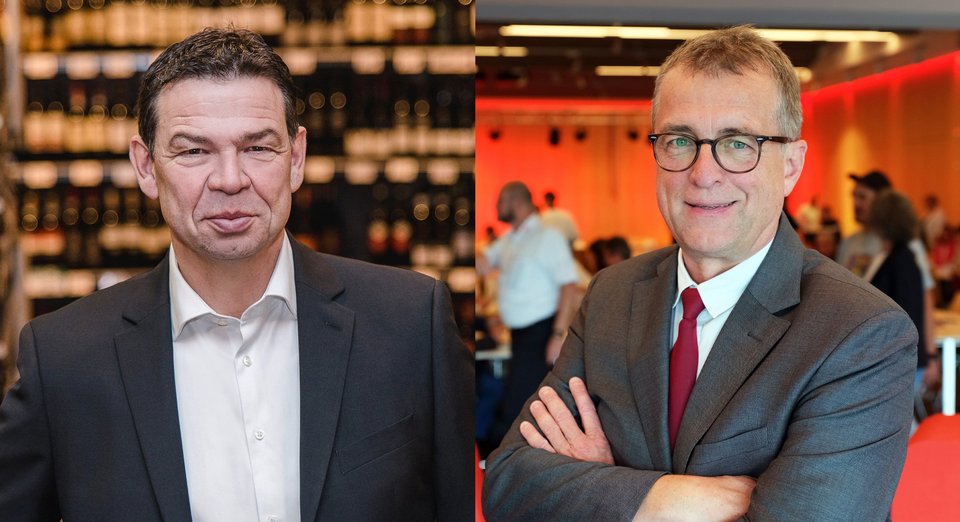
After ten years, Erich Stockhausen has handed over the chairmanship of the REWE Group Supervisory Board to Stefan Lenk. In this interview, the two talk about team spirit, co-operative entrepreneurship - and why it is not the origin of the musicians that matters in a good orchestra, but how they play together.
one: Mr Stockhausen, you were Chairman of the Supervisory Board of REWE Group for ten years and the first REWE businessman to hold this position. Was it a big change back then to suddenly become the top supervisor of such a large group?
Erich Stockhausen: It wasn't that big a change because I had already been on the board for nine years. I was Chairman of the Supervisory Board at REWE West for ten years before that. So I basically knew what to expect. We have a strong team today. The chairmanship of the Supervisory Board is not a one-man show, but a team story. Stefan Lenk and the other colleagues provide strong support. We have grown into the role together over the years.
one: When you look back: Is there a challenge, event or task that stands out in your memory?
Erich Stockhausen: With corona and other events, the requirements have become more and more demanding. But as a team, I think we managed them well in the end. One great event was the decision and implementation of the privatisation of the Billa stores in Austria. In the recent past in particular, we took bold steps with Switch and REWE Bonus, which were certainly a challenge, but which, as we all realise, are going well.
one: What are you particularly proud of in the last 10 years?
Erich Stockhausen : The culture at REWE is certainly remarkable, something that doesn't exist in other companies. We have separated operations from politics. We don't do much corporate politics, we concentrate on our work. I am particularly proud that we have been able to involve the employee representatives so well, that they are so strongly involved and constructively support the well-being of REWE. I find that extraordinarily remarkable. In the triad of owners, managers and employee representatives, we have a good team that has developed a lot of team spirit and can make good decisions for the benefit of REWE.
one: Has the work of the Supervisory Board changed as a result of the retailers' perspective at the top? Have you been able to provide new impetus? And perhaps vice versa: has your perspective as a businessman changed as a result of your work on the Supervisory Board?
Erich Stockhausen: The range has naturally widened and ultimately you have to move away from the idea of clientele when working on the Supervisory Board of REWE-Zentral-Finanz eG. You certainly can't just play this role as a businessman, but in the end you have to act for the good of the whole and try to make decisions accordingly. These are two dimensions. But in the end, I think we managed to do this sensibly.
one: Do you generally leave office with a smile or a tear in your eye?
Erich Stockhausen: Laughing and crying, that's how it is. The work has grown incredibly close to my heart. I've done this for REWE for many, many years, for the retailers, for the employees and for the employee representatives. But the bottom line is that everything takes time. Changes take time and need to be prepared for. And REWE is an organisation that does not change completely overnight. If we change course by two degrees today, we will be somewhere completely different in ten years' time. Accordingly, the perspective must always be long-term. My credo has always been to develop REWE in such a way that our children enjoy the business. As everything is in good hands, I also have a smile on my face. We are well positioned, we are on the right track.
one: What will you be spending more time on in future?
Erich Stockhausen: I have the idea of preparing the shops we run so well that my daughter can carry on well. There's still a bit of work to do. I'll be doing that over the next few years. The time and effort for REWE was already enormous. Over the last 15 years, our revenue has grown from 38 billion to 88 billion euros. It's getting more and more complex, the demands aren't getting any less and the time required isn't getting any less. So, I still have a lot to do with my shops. And then I will try to let my working life slowly come to an end.
one: Mr Lenk, in addition to your self-employment as a REWE businessman, you have been involved in many different areas for many years. Among other things, you are Chairman of the Supervisory Board of REWE Dortmund and chair the MLF, an association of medium-sized food retailers. Where do you find the energy for another time-consuming mandate?
Stefan Lenk: I think you can only use your energy for things that are important to you, that you enjoy and that not only you, but also others, believe you can do to some extent. We are very well organised at home. I'm very, very lucky that my wife and three boys are all involved in the company. The boys are all already involved, with a total of 75 per cent. There's a lot of energy, so you have to make sure you keep up. We can't afford to let up, and I don't intend to. As long as I have functions, my sons will let me work with them, and I still have a bit to do.
one: When you look back on your predecessor's time in office: In your view, what was his most important achievement? What do you think remains of Erich Stockhausen? What is his legacy?
Stefan Lenk: I think the most important thing is the respectful interaction between management, employees and shareholders on an equal footing. For me, that would be the first point that we have worked on together over the years, but which was largely driven by Erich Stockhausen. The second is that we have an unbelievably trusting cooperation, that we no longer have competition between the regions. Erich Stockhausen has helped to ensure that REWE Dortmund now sees itself as a fully-fledged part of the REWE Group and is fully committed to it. And what has always impressed me: That Erich Stockhausen always struck the right note, even in difficult situations. And he sets the bar pretty high. But I also need a bit of encouragement.
one: You have worked closely with Mr Stockhausen for more than eight years and have already announced that you will continue on this successful path. What new accents would you like to set? Or to put it another way: what challenges do you think we will have to prepare for at REWE in the future?
Stefan Lenk: As I said before, we want to continue our successful work. Basically, we are always working on structures that are as I just described. Everything must be focussed on the requirements of the future. The second thing is that issues are coming to the table that we may not even see today. I believe that the future will be challenging. And that's where I think we need to stand together, we need to trust each other. And when we have made a decision as a team, with the management, with the employee representatives, then we have to stand by it, we have to trust each other and stand together like a wall, nobody can get in the way.
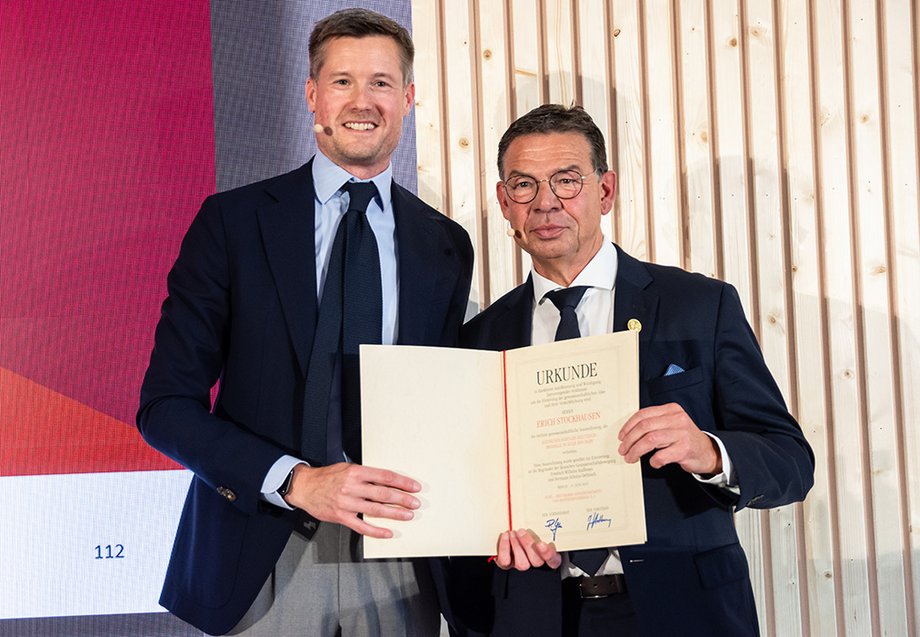 Jan Holthaus and Erich Stockhausen (Photo: Achim Bachhausen)
Jan Holthaus and Erich Stockhausen (Photo: Achim Bachhausen)
"Gold" for Erich Stockhausen
A great honour for Erich Stockhausen: at this year's Annual General Meeting of REWE Group, our former Chairman of the Supervisory Board received an extremely rare award in recognition of his many years of service to the cooperative sector.
Following his last Annual General Meeting as Chairman of the Supervisory Board, Jan Holthaus, Management Board of the German Cooperative and Raiffeisen Association (DGRV), honoured Erich Stockhausen with the association's highest award, the Raiffeisen/Schulze-Delitzsch Medal in Gold.
"Today we are honouring a person who has contributed to REWE's success throughout his entire professional life," emphasised Jan Holthaus in his laudatory speech. Thanks to his prudent and balanced approach, he has succeeded in uniting the REWE cooperative and creating a new sense of unity between the executive bodies, retailers and partners.
Jan Holthaus continued: "In the four decades of his cooperative commitment, Erich Stockhausen has contributed in a special way to the vitalisation of cooperative values in the REWE Group - far beyond his own cooperative."
The Raiffeisen/Schulze-Delitzsch Gold Medal of the DGRV is the highest honour of the cooperative umbrella organisation in Germany. It is awarded to a maximum of 100 living personalities.
one: Mr Lenk, Mr Stockhausen, our company has developed very dynamically over the past ten years. Companies such as Lekkerland have been integrated. REWE Group has grown continuously, even in a challenging environment, stronger than many of its competitors. Do you think this also has something to do with the co-operative form of business?
Erich Stockhausen: I think so. Ultimately, of course, you can set priorities and organise things in such a way that you can have a significant influence on long-term development. With some short-term decisions, the question arises in retrospect as to whether they were right when you look at them in the long term. The long-term goal is defined and the decisions that lead to it are usually the right ones. If the long-term goal is right, then I also make the right decisions. I think that's where co-operatives - and not short-term thinking - play a big role. You also have to be a bit brave, because if you look at REWE's property strategy, you can say that we are taking the effort on our shoulders today so that it will be easier for future generations and they will have a decent base of rental income. It's about doing things today, the fruits of which I can no longer reap myself, but which will be there for future generations.
Stefan Lenk: A cooperative is like a family, it's an intergenerational contract. I recently heard a presentation at a seminar in which the speaker asked: What is sustainability? Sustainability is running a company in a way that can be passed on. And at REWE, everything comes together well thanks to the intergenerational contract. I think we are in a great position with our legal form. No money is taken out, it is invested for the whole, for the future. That plays a huge role.
Erich Stockhausen: The same applies to the children of employees. We are preserving jobs. We are preserving a good company, as Stefan Lenk says, for the next generation, so that people can find work or become self-employed there again.
one: The number of self-employed retailers is also continuing to rise. How high do you estimate the potential of the privatisation rate to be?
Stefan Lenk: I don't think it's possible to generalise. The truth is that if you offer a market, there have to be people who want the location. And the whole thing is usually priced. There will be a limit somewhere. There will always be locations that you have chosen with the best of your knowledge and conscience, but where you still don't see the future viability. The important thing is that we do it and privatise between 70 and 100 stores every year. We are the biggest start-up that Germany has to offer.
Erich Stockhausen: It always has to be a question of what is feasible. In the end, you also need the operator for the location. We can see that we've also had a great development in Austria in the last year. we now have 23 self-employed people there. We want to create 45 this year, and even 100 by 2027. That's a nice size. We already have a bit of substance there to perhaps found a cooperative that fits in with REWE. I find this idea of the international merchant family very charming, because it also proves that protectionism is not the right thing to do, but rather opening up to other cultures. We employ people from 129 nations, out of 180 in the world. So we are already quite multicultural and show every day that it works well. An orchestra is made up of good musicians, no matter where they come from. If you see REWE as an orchestra, then it doesn't matter where the people come from, the main thing is that they work together. At the end of the day, I need good musicians to have a good orchestra. Punkt.
one: As you know, you know REWE Group not only from a helicopter perspective, but - as a long-standing and successful entrepreneur - also and above all from the bread-and-butter business. What do you think characterises our cooperative in particular (also in comparison with other cooperatives)? What makes REWE unique and special?
Stefan Lenk: I think we treat each other decently at all levels, as equals, with appreciation and with a strong focus on where we want to go. There are clean processes that ensure that everyone feels they are being treated fairly, whether it's in store allocations or anywhere else. We are exemplary in this respect.
Erich Stockhausen: For young retailers and young people who want to start their own business, we have the best concept with our risk equalisation model. In addition, we have developed other concepts that allow investment and entrepreneurship to develop further. All in all, this is unique. We can see this in the development of self-employment in Germany. In other categories such as shoes, boutiques or flowers, the number of independent retailers is falling. And with us? We are constantly evolving. We have three to five applications for every store. The number of independent retailers is growing. So something seems to be working, including in our public image, so that young people are happy to come to us and set up their own business with us - exactly against the trend. I recently saw a statistic. They show that we are losing 10,000 self-employed people a year in Germany. But we're seeing more and more of them.
one: Mr Stockhausen, what good advice would you like to give your successor?
Erich Stockhausen: I have no advice to give. I think we have worked together so intensively and so well over the last few years that you don't have to attribute all the positive things to me, but you have to give the team credit for them. I also don't think my successor will need much time to find his feet, because we all made the decisions as a team beforehand. They are supported by everyone. Only one person leaves and another takes over, but everything continues in the same way. Knowing this makes it easier for me to say goodbye.
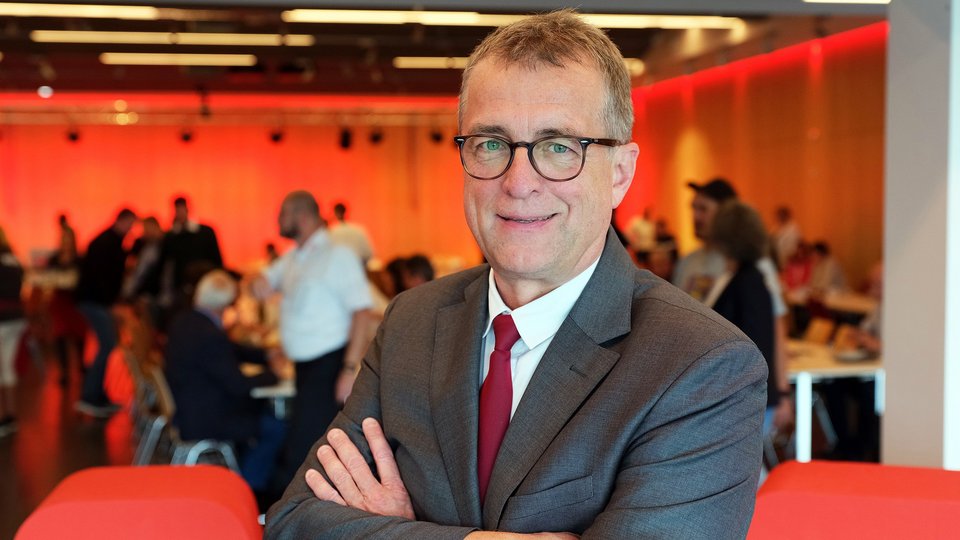
Stefan Lenk (63) opened his first REWE store in 1983. Today, together with his wife Claudia and their three sons, he runs the family business with nine stores, a total turnover of more than €100 million and more than 500 employees. The company was founded by his parents in 1963 on 40 square metres in Bochum. Stefan Lenk has held a seat on the Supervisory Board of REWE Dortmund since 2014 and has been its Chairman since 2016. He has also been a member of the Supervisory Board of REWE Group since 2016 and Chairman of the Audit Committee since 2018. Stefan Lenk has been Chairman of the Supervisory Board since this year's Annual General Meeting.
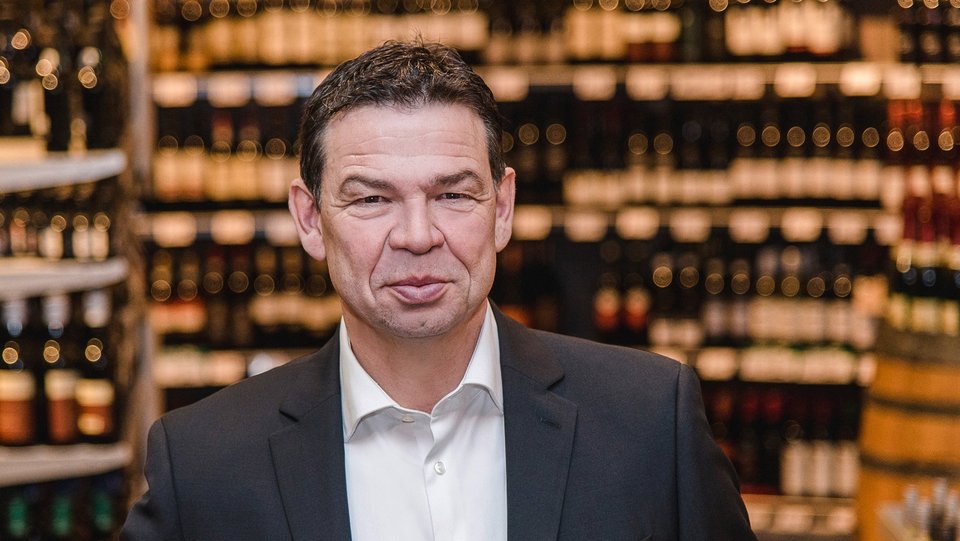
Erich Stockhausen (66) has been an independent REWE merchant with two stores in Erkrath in the Rhineland since 1987. He has been a member of the Supervisory Board of REWE-ZENTRALFINANZ eG (RZF), the head company of REWE Group, since 2006. He chaired the board as "Chief Supervisor" for ten years. The passionate cyclist is married to his wife Barbara and father of two daughters. The eldest, Luisa Stockhausen (21), is gradually taking on responsibility in the family business.

